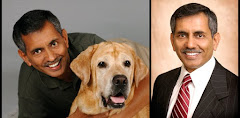Here are some recent examples of articulate Americans and others using a vivid, evocative expression to emphasize something--examples which, I hope, will inspire the rest of us into similarly imaginative use of the language, especially when we are trying to break through the clutter.
1. Contrasting the Nixon presidency with current political times, Bob Woodward saying on “Face the Nation” this past weekend: “In the Nixon era, the piston driving the Nixon presidency was hate. We now have a lot of conflict, a lot of disagreement, but I don’t see hate in our politics.”
2. While commenting on the Fed’s plan to pump money into the economy by buying government debt, Alan Blinder--former vice chair of the Federal Reserve—telling PBS: “Here is another alternative for the Fed. Currently, it pays banks about a quarter percent on their account reserves. The Fed could lower that to zero, or even go negative (by charging them) to kind of sandblast that money out of the banks and into the economy.”
3. Talking about Cleopatra’s extraordinary verbal skills, Stacy Schiff, who has recently authored a biography of the famous queen, telling PBS’s “Newshour”: “…fluent in nine languages, able to converse with her own subjects, which no earlier king or queen of her dynasty had been able to do, and apparently just a persuasive, silken arguer and speaker, according to Plutarch.”
4. Speaking about the nation’s financial problems during a recent edition of NBC’s “Meet the Press,” Bethany McLean (yes, she of “The Smartest Guys in the Room” fame) telling fellow panelists, which included Alan Greenspan and Newt Gingrich, “People at this table may disagree with me but it seems to me that our budget problems are not calculus, they are not algebra, they are simple arithmetic. We are spending three dollars for every two dollars we take in. Something needs to give.”
1. Contrasting the Nixon presidency with current political times, Bob Woodward saying on “Face the Nation” this past weekend: “In the Nixon era, the piston driving the Nixon presidency was hate. We now have a lot of conflict, a lot of disagreement, but I don’t see hate in our politics.”
2. While commenting on the Fed’s plan to pump money into the economy by buying government debt, Alan Blinder--former vice chair of the Federal Reserve—telling PBS: “Here is another alternative for the Fed. Currently, it pays banks about a quarter percent on their account reserves. The Fed could lower that to zero, or even go negative (by charging them) to kind of sandblast that money out of the banks and into the economy.”
3. Talking about Cleopatra’s extraordinary verbal skills, Stacy Schiff, who has recently authored a biography of the famous queen, telling PBS’s “Newshour”: “…fluent in nine languages, able to converse with her own subjects, which no earlier king or queen of her dynasty had been able to do, and apparently just a persuasive, silken arguer and speaker, according to Plutarch.”
4. Speaking about the nation’s financial problems during a recent edition of NBC’s “Meet the Press,” Bethany McLean (yes, she of “The Smartest Guys in the Room” fame) telling fellow panelists, which included Alan Greenspan and Newt Gingrich, “People at this table may disagree with me but it seems to me that our budget problems are not calculus, they are not algebra, they are simple arithmetic. We are spending three dollars for every two dollars we take in. Something needs to give.”

